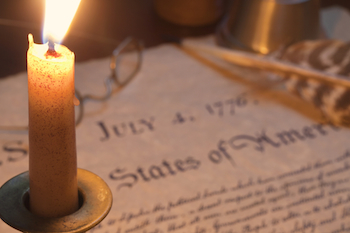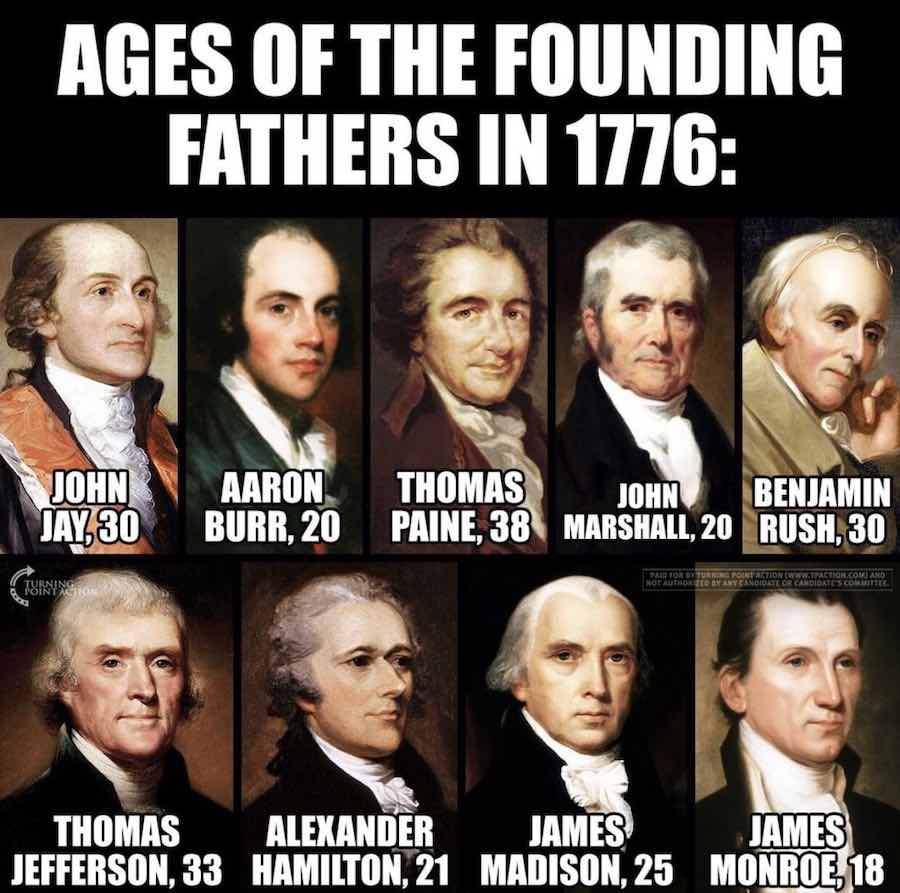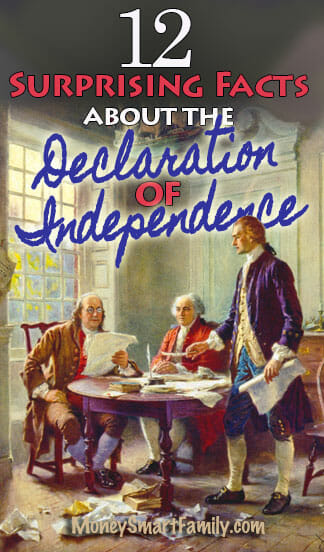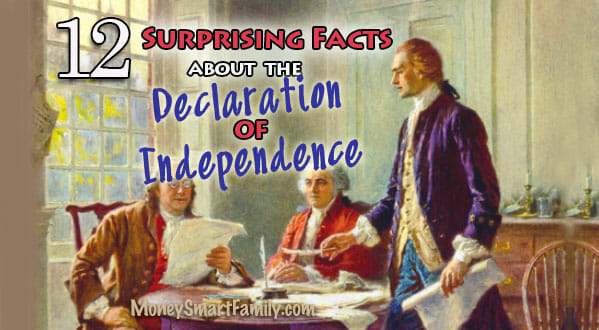The Declaration of Independence in the United States is one of the most revered documents in our history. It was a bold statement by oppressed men and women to gain freedom from a tyrannical English government.
No matter your political affiliation or beliefs, we should admire these courageous men who willingly put their lives and fortunes on the line to overcome tyrannical leadership.
12 Declaration of Independence Facts You May Not Know
TABLE OF CONTENTS
12 Declaration of Independence Facts You May Not Know
Do you know these 12 Declaration of Independence facts about this most famous document? Also, do you know the bonus answer … how old were each of the signers in July of 1776? Keep reading to find out.
1) The Resolve to Move Toward Independence
It was Richard Henry Lee of Virginia who proposed the resolution that “That these United Colonies are, and of right ought to be, free and independent states, that they are absolved from all allegiance to the British Crown, and that all political connection between them and the State of Great Britain is, and ought to be, totally dissolved.” Lee’s resolution was submitted on June 7, 1776.
2) The Date of U.S. Independence
The day that Continental Congress voted for independence was July 2, not July 4. They debated Thomas Jefferson’s document for two days before agreeing to the final version on July 4, when it was also read to the public for the first time.
3) The Prediction About Independence
On July 3, John Adams wrote to his wife, Abigail, that “The Second Day of July 1776, will be the most memorable Epocha in the History of America. I am apt to believe that it will be celebrated, by succeeding generations, as the great anniversary festival.”
4) The Signing of the Declaration of Independence
The document wasn’t signed by members of Congress until Aug. 2, and some members didn’t sign until months later.
5) The Vote “All for One and One for All!”
The vote for independence was not unanimous. Only 12 of the 13 state delegations to the Continental Congress voted for declaring independence. New York abstained. (The colony eventually supported the measure a week later).
6) The Semantics
Are our rights “unalienable” or “inalienable?” The final version of the Declaration uses “unalienable,” whereas Jefferson’s handwritten draft uses “inalienable.” Actually, it doesn’t matter. Both are correct and both mean the same thing.

7) Who Actually Penned the Declaration of Independence?
The beautifully handwritten and signed copy that we all recognize as the Declaration of Independence wasn’t physically written by Jefferson, but, historians believe, by Timothy Matlack. Matlack became a member of the Second Continental Congress.
8) The Back Side of The Declaration Document?
Remember in the movie National Treasure – there was a secret code on the back of the Declaration of Independence, well, is there anything on the back of the real document?
Yes.
It reads, upside down, “Original Declaration of Independence dated 4th July 1776.“
9) The Final Version of the Declaration Edits Slavery
In the original draft, Jefferson, a slave owner, lists the commerce of slavery as one of the violations that justify a break from England. The passage was stripped from the final version at the demand of the southern states, who would not vote for independence otherwise.
10) News and Announcement about The Declaration of Independence
Britain didn’t learn of her colonies’ newfound independence until Aug. 30, 1776.
11) Six Men Who Signed the Declaration also Signed the Constitution
In September of 1787, 11 years later, Benjamin Franklin was among a handful of people who signed both the Declaration of Independence and the Constitution. The others signers of both documents were George Read, Roger Sherman, Robert Morris, George Clymer, and James Wilson.
12) There were 200 Copies Made Call Dunlap’s Broadside
The signers of the Declaration of Independence sent the document to a printer named John Dunlap. The printer created 200 copies of the document. They have been called the Dunlap Broadside. These copies were printed with John Hancock’s name printed at the bottom. Today, only 26 of these documents remain.
In 1989 in Adamstown, PA, a yard sale buyer purchased an old painting in a beautiful frame. He paid $4 for the picture and frame.
As he was inspecting the picture the copy of the Declaration of Independence fell out. It was tucked behind an old picture in a frame. That version of the Declaration was eventually acquired by TV producer Norman Lear for $8.1 million. You can read more details about this story in the April 3, 1991 article in the Washington Post.
BONUS: Ages of The Founding Fathers
This really surprised us when we saw this image on X. We dug in a little deeper and discovered that many of the most revered men who were instrumental in the founding of America were very young. Not all of these men signed the Declaration of Independence.

- James Monroe, 18
- Aaron Burr, 20
- John Marshall, 20
- Alexander Hamilton, 21
- James Madison, 25
- Benjamin Rush, 30
- John Jay, 30
- Thomas Jefferson, 33
- Thomas Paine, 38
- John Hancock, 39
- John Adams, 40
- Paul Revere, 41
- George Washington, 44
Ages of the Men Who Signed the Declaration of Independence
We searched the internet to get this information and came up short. So we consulted with ChatGPT and it created a list for us based on the birth year of each of the signers.
They ranged in age from 27 years old to 70 years old. The average age was
Here’s the list of the signers of the Declaration of Independence sorted from youngest to oldest based on their age in 1776:
- George Walton, 27
- Edward Rutledge, 27
- Thomas Lynch, Jr., 27
- Thomas Heyward, Jr., 30
- Benjamin Rush, 30
- Elbridge Gerry, 32
- Thomas Stone, 33
- Thomas Jefferson, 33
- William Hooper, 34
- Arthur Middleton, 34
- James Wilson, 34
- John Penn, 35
- Samuel Chase, 35
- William Paca, 36
- George Clymer, 37
- Thomas Nelson, Jr., 38
- John Hancock, 39
- Charles Carroll of Carrollton, 39
- Francis Hopkinson, 39
- Carter Braxton, 40
- Button Gwinnett, 41
- John Adams, 41
- Francis Lightfoot Lee, 42
- Robert Morris, 42
- Thomas McKean, 42
- William Floyd, 42
- George Read, 43
- Richard Henry Lee, 44
- Robert Treat Paine, 45
- Samuel Huntington, 45
- William Williams, 45
- Joseph Hewes, 46
- George Ross, 46
- Richard Stockton, 46
- William Whipple, 46
- Josiah Bartlett, 47
- Caesar Rodney, 48
- William Ellery, 49
- George Wythe, 50
- Benjamin Harrison, 50
- Lewis Morris, 50
- Abraham Clark, 50
- Oliver Wolcott, 50
- John Morton, 51
- Lyman Hall, 52
- John Witherspoon, 53
- Samuel Adams, 54
- Roger Sherman, 55
- James Smith, 57
- George Taylor, 60
- Philip Livingston, 60
- Matthew Thornton, 62
- Francis Lewis, 63
- John Hart, 63
- Stephen Hopkins, 69
- Benjamin Franklin, 70
Presidents Who Died on July 4
John Adams (2nd POTUS) & Thomas Jefferson (3rd POTUS): Founding fathers, John Adams (90 years old) and Thomas Jefferson (83 years old), both signers of the Declaration of Independence, died on the same day: July 4, 1826, exactly 50 years after the Declaration was adopted.
The fifth president of the United States, James Monroe died at the age of 73 on July 4, 1831.
Read The Declaration of Independence, in its entirety.
IN CONGRESS, July 4, 1776.
The unanimous Declaration of the thirteen United States of America,
When in the Course of human events, it becomes necessary for one people to dissolve the political bands which have connected them with another, and to assume among the powers of the earth, the separate and equal station to which the Laws of Nature and of Nature’s God entitle them, a decent respect to the opinions of mankind requires that they should declare the causes which impel them to the separation.
We hold these truths to be self-evident, that all men are created equal, that they are endowed by their Creator with certain unalienable Rights, that among these are Life, Liberty and the pursuit of Happiness.–That to secure these rights, Governments are instituted among Men, deriving their just powers from the consent of the governed,
–That whenever any Form of Government becomes destructive of these ends, it is the Right of the People to alter or to abolish it, and to institute new Government, laying its foundation on such principles and organizing its powers in such form, as to them shall seem most likely to effect their Safety and Happiness.
Prudence, indeed, will dictate that Governments long established should not be changed for light and transient causes; and accordingly, all experience hath shewn, that mankind are more disposed to suffer, while evils are sufferable than to right themselves by abolishing the forms to which they are accustomed.
But when a long train of abuses and usurpations, pursuing invariably the same Object evinces a design to reduce them under absolute Despotism, it is their right, it is their duty, to throw off such Government, and to provide new Guards for their future security.–Such has been the patient sufferance of these Colonies; and such is now the necessity which constrains them to alter their former Systems of Government.
The history of the present King of Great Britain is a history of repeated injuries and usurpations, all having in direct object the establishment of an absolute Tyranny over these States. To prove this, let Facts be submitted to a candid world.
The Next Part
He has refused his Assent to Laws, the most wholesome and necessary for the public good.
He has forbidden his Governors to pass Laws of immediate and pressing importance, unless suspended in their operation till his Assent should be obtained; and when so suspended, he has utterly neglected to attend to them.
He has refused to pass other Laws for the accommodation of large districts of people, unless those people would relinquish the right of Representation in the Legislature, a right inestimable to them and formidable to tyrants only.
He has called together legislative bodies at places unusual, uncomfortable, and distant from the depository of their public Records, for the sole purpose of fatiguing them into compliance with his measures.
He has dissolved Representative Houses repeatedly, for opposing with manly firmness his invasions on the rights of the people.He has refused for a long time, after such dissolutions, to cause others to be elected; whereby the Legislative powers, incapable of Annihilation, have returned to the People at large for their exercise; the State remaining in the mean time exposed to all the dangers of invasion from without, and convulsions within.
He has endeavoured to prevent the population of these States; for that purpose obstructing the Laws for Naturalization of Foreigners; refusing to pass others to encourage their migrations hither, and raising the conditions of new Appropriations of Lands.
He has obstructed the Administration of Justice, by refusing his Assent to Laws for establishing Judiciary powers.
He has made Judges dependent on his Will alone, for the tenure of their offices, and the amount and payment of their salaries.
He has erected a multitude of New Offices, and sent hither swarms of Officers to harrass our people, and eat out their substance.
He has kept among us, in times of peace, Standing Armies without the Consent of our legislatures.
He has affected to render the Military independent of and superior to the Civil power.
The Next Part
He has combined with others to subject us to a jurisdiction foreign to our constitution, and unacknowledged by our laws; giving his Assent to their Acts of pretended Legislation:
For Quartering large bodies of armed troops among us:
For protecting them, by a mock Trial, from punishment for any Murders which they should commit on the Inhabitants of these States:
For cutting off our Trade with all parts of the world:
For imposing Taxes on us without our Consent:
For depriving us in many cases, of the benefits of Trial by Jury:
For transporting us beyond Seas to be tried for pretended offences.
For abolishing the free System of English Laws in a neighbouring Province, establishing therein an Arbitrary government, and enlarging its Boundaries so as to render it at once an example and fit instrument for introducing the same absolute rule into these Colonies:
For taking away our Charters, abolishing our most valuable Laws, and altering fundamentally the Forms of our Governments:
For suspending our own Legislatures, and declaring themselves invested with power to legislate for us in all cases whatsoever.
He has abdicated Government here, by declaring us out of his Protection and waging War against us.
He has plundered our seas, ravaged our Coasts, burnt our towns, and destroyed the lives of our people.
He is at this time transporting large Armies of foreign Mercenaries to compleat the works of death, desolation and tyranny, already begun with circumstances of Cruelty & perfidy scarcely paralleled in the most barbarous ages, and totally unworthy the Head of a civilized nation.
He has constrained our fellow Citizens taken Captive on the high Seas to bear Arms against their Country, to become the executioners of their friends and Brethren, or to fall themselves by their Hands.
He has excited domestic insurrections amongst us, and has endeavoured to bring on the inhabitants of our frontiers, the merciless Indian Savages, whose known rule of warfare, is an undistinguished destruction of all ages, sexes and conditions.
The Next Part
In every stage of these Oppressions, We have Petitioned for Redress in the most humble terms: Our repeated Petitions have been answered only by repeated injury. A Prince whose character is thus marked by every act which may define a Tyrant is unfit to be the ruler of a free people.
Nor have We been wanting in attentions to our Brittish brethren. We have warned them from time to time of attempts by their legislature to extend an unwarrantable jurisdiction over us. We have reminded them of the circumstances of our emigration and settlement here.
We have appealed to their native justice and magnanimity, and we have conjured them by the ties of our common kindred to disavow these usurpations, which, would inevitably interrupt our connections and correspondence. They too have been deaf to the voice of justice and of consanguinity.
We must, therefore, acquiesce in the necessity, which denounces our Separation, and hold them, as we hold the rest of mankind, Enemies in War, in Peace Friends.
We, therefore, the Representatives of the United States of America, in General Congress, Assembled, appealing to the Supreme Judge of the world for the rectitude of our intentions, do, in the Name, and by Authority of the good People of these Colonies, solemnly publish and declare, That these United Colonies are, and of Right ought to be Free and Independent States;
that they are Absolved from all Allegiance to the British Crown, and that all political connection between them and the State of Great Britain, is and ought to be totally dissolved; and that as Free and Independent States, they have full Power to levy War, conclude Peace, contract Alliances, establish Commerce, and to do all other Acts and Things which independent states may of right do.
And for the support of this Declaration, with a firm reliance on the protection of divine Providence, we mutually pledge to each other our Lives, our Fortunes, and our sacred Honor.

Signatures on the Declaration of Independence
Column 1
Georgia:
Button Gwinnett
Lyman Hall
George Walton
Column 2
North Carolina:
William Hooper
Joseph Hewes
John Penn
South Carolina:
Edward Rutledge
Thomas Heyward, Jr.
Thomas Lynch, Jr.
Arthur Middleton
Column 3
Massachusetts:
John Hancock
Maryland:
Samuel Chase
William Paca
Thomas Stone
Charles Carroll of Carrollton
Virginia:
George Wythe
Richard Henry Lee
Thomas Jefferson
Benjamin Harrison
Thomas Nelson, Jr.
Francis Lightfoot Lee
Carter Braxton
Column 4
Pennsylvania:
Robert Morris
Benjamin Rush
Benjamin Franklin
John Morton
George Clymer
James Smith
George Taylor
James Wilson
George Ross
Delaware:
Caesar Rodney
George Read
Thomas McKean
Column 5
New York:
William Floyd
Philip Livingston
Francis Lewis
Lewis Morris
New Jersey:
Richard Stockton
John Witherspoon
Francis Hopkinson
John Hart
Abraham Clark
Column 6
New Hampshire:
Josiah Bartlett
William Whipple
Massachusetts:
Samuel Adams
John Adams
Robert Treat Paine
Elbridge Gerry
Rhode Island:
Stephen Hopkins
William Ellery
Connecticut:
Roger Sherman
Samuel Huntington
William Williams
Oliver Wolcott
New Hampshire:
Matthew Thornton
If you’d like some more great ideas for July 4th, see our Pinterest board with this theme.
And if you’d like to see some DIY Patriotic home decor, click on this suggested page!

